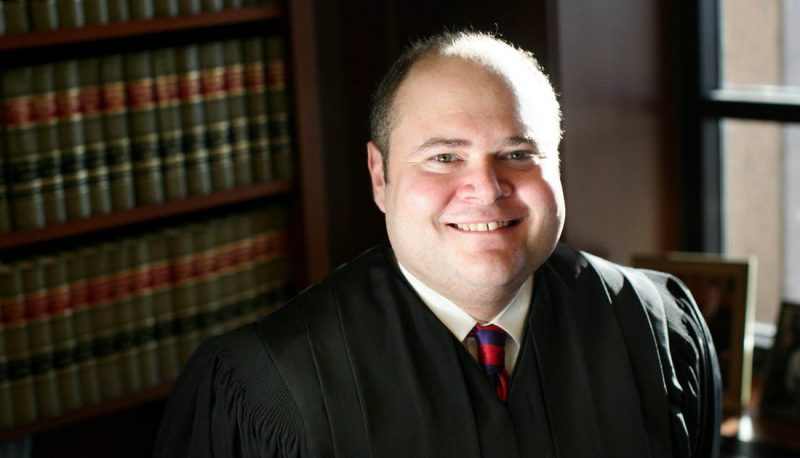“Confirmed Judges, Confirmed Fears” is a blog series documenting the harmful impact of President Trump’s judges on Americans’ rights and liberties.
Trump 8th Circuit judge David Stras argued in a November dissent in Rodgers v. Bryant that a district court should not have stopped Arkansas from enforcing an anti-loitering law that applied only to people who ask for money, food or other charity while a lawsuit that challenged the law as unconstitutional was pending. Although Stras agreed that the two people who brought the suit had shown that the law likely violates the First Amendment, he claimed that the preliminary injunction against the law should somehow be limited just to the two plaintiffs, so that the law could be enforced against everyone else. The two judges in the majority, both appointed by President George W. Bush, squarely rejected Stras’ argument.
Michael Rodgers and Glynn Dilbeck are poor people who live in Arkansas and often communicate, carry signs, and solicit contributions from passers-by in public places. After being arrested under state anti-loitering laws, they brought a free-speech challenge to a new state law that bans people from remaining in a public place “for the purpose of asking for anything as charity or a gift” if they do so in a way that is “likely to cause alarm” or “create a traffic hazard or impediment” or harass others. A district court found that Rodgers and Dilbeck would likely prevail on their First Amendment challenge because of the broad and vague language in the law and because it discriminatorily applies only to those who solicit charitable contributions, as opposed to those who speak for political or commercial purposes. The court also found that enforcement of the law would likely cause irreparable harm to the plaintiffs, and issued a preliminary injunction against enforcement of the law while the suit was pending. Arkansas immediately appealed.
All three judges who heard the appeal—Trump judge Stras as well as George W. Bush appointees Michael Melloy and Lavenski Smith—agreed that Rodgers and Dilbeck would likely prevail on their contention that the law violates the First Amendment, and that it should not be enforced against them in the meantime. But Stras partially dissented from the decision affirming the lower court order, asserting that the preliminary injunction should apply only to the two of them and that otherwise, Arkansas should be able to enforce its law. Based on his reading of precedent, Stras maintained that the district court’s statewide injunction could be valid only if the “High Court of Chancery in England” could have issued such a broad injunction in 1789, and concluded that it could not. He also claimed that such a broad injunction was not necessary and could conceivably harm others, and that even if such injunctions had been approved before in similar cases, that “does not prevent us from reaching the right answer now.”
The majority firmly rejected Stras’ claims. Based on longstanding Supreme Court precedent, the majority explained, the scope of an injunction against illegal conduct “is dictated by the extent of the violation established,” not by the “geographical extent” of those challenging the misconduct. In this case, the majority went on, Arkansas’ improper law “impacts the entire state” and the district court found that it was “plainly unconstitutional” and that completely enjoining its enforcement while the lawsuit went forward would cause “no injury.” It would be improper to require people like Rodgers and Dilbeck to bear the burden of proving they can represent a class of all Arkansans, the majority noted. They also explained that many other courts had similarly granted statewide relief against state laws that are facially unconstitutional, and it would be highly impractical to try to limit the injunction to just two people who may attempt to exercise their rights at various locations in the state.
In short, the majority concluded, the “scope” of the preliminary injunction “reflects no abuse of discretion on the part of the district court,” and the decision was affirmed. But if it had been up to Stras, the injunction would have been reversed or somehow narrowed, and Arkansas would have been able to continue to enforce a plainly unconstitutional law that criminalizes and perpetuates poverty.
In March, 2020, the full Eighth Circuit declined to rehear the case at 2020 US App LEXIS 7674. Stras again dissented, and was the only judge, whether appointed by a Republican or a Democrat, to do so.
This post has been updated.

